新概念 第二册Lesson 2-3
新概念二Lesson 2
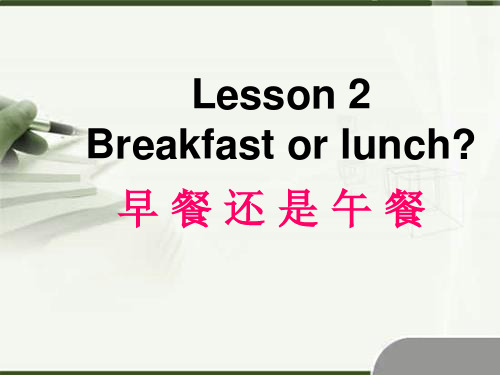
Exercises
A Write out these two paragraphs again. Give the right form of the words in parentheses.
1. I am looking out of my window. I can see some children in the street. The children ___________ are playing (play) football. They always play (play) football in the street. Now a _____ is kicking (kick) the ball. little boy _________ Another boy __________ is running (run) after him but he cannot catch him.
2)how 结构 (以形容词,副词为主) ① how + adj./adv. + 主 + 谓! ② how + adj. + a/(an) + cn.(单)+ 主 + 谓! ③ how + 主 + 谓!(实义动词作谓语)
他是一个多么可爱的男孩啊!
What a lovely boy he is! How lovely a boy he is! How lovely the boy is!
B Write these sentences again. Put the words in parenctheses in the right place. 1. She answers my letters. (rarely) She rarely answers my lettters. 2. We work after six o'clock. (never) We never work after six o'clock.
新概念英语第二册课文
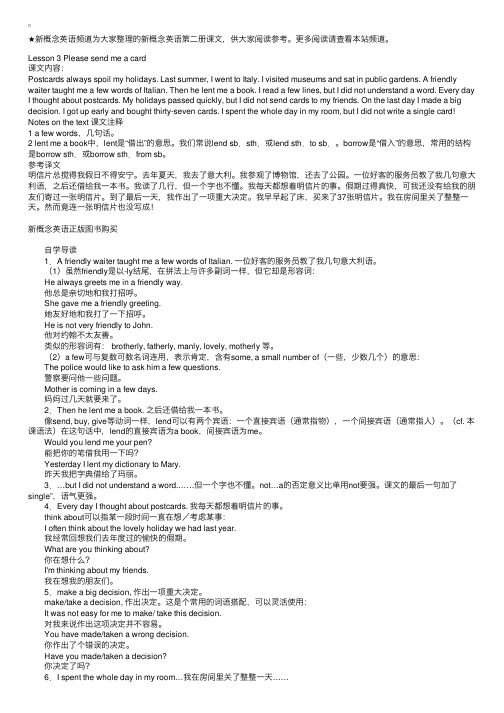
★新概念英语频道为⼤家整理的新概念英语第⼆册课⽂,供⼤家阅读参考。
更多阅读请查看本站频道。
Lesson 3 Please send me a card课⽂内容:Postcards always spoil my holidays. Last summer, I went to Italy. I visited museums and sat in public gardens. A friendly waiter taught me a few words of Italian. Then he lent me a book. I read a few lines, but I did not understand a word. Every day I thought about postcards. My holidays passed quickly, but I did not send cards to my friends. On the last day I made a big decision. I got up early and bought thirty-seven cards. I spent the whole day in my room, but I did not write a single card! Notes on the text 课⽂注释1 a few words,⼏句话。
2 lent me a book中,lent是“借出”的意思。
我们常说lend sb.sth.或lend sth.to sb.。
borrow是“借⼊”的意思,常⽤的结构是borrow sth.或borrow sth.from sb。
参考译⽂明信⽚总搅得我假⽇不得安宁。
去年夏天,我去了意⼤利。
我参观了博物馆,还去了公园。
⼀位好客的服务员教了我⼏句意⼤利语,之后还借给我⼀本书。
我读了⼏⾏,但⼀个字也不懂。
新概念英语第二册

★ privacy n.隐私
It‟s privacy. 这是我的隐私
★seat
n.座位
• have a good seat/place, • take a seat/take your seat 坐下来, 就坐 • Is the seat taken? 这个位置有人吗? 请坐的3种说法 : • Sit down, please. (命令性) • Take your seat, please. • Be seated, please. (更礼貌)
用 come 的现在进行时态 be coming 表示一 般将来,表示近期按计划或安排要进行的 动作。同样用法的动词有:go,come, leave,arrive,land,meet,die,start, return,join…
• 7、Dear me!天哪! • 英国人说Dear me! 或My dear! • 美国
1、Last week I went to the theatre. • go to the +地点 表示去某地干什么事 • go to the theatre = go to the theatre to see a play去剧 场看戏 • go to the cinema =see a film 去电影院看电影
Lesson 2 Breakfast or lunch?
【New words and expressions】(5)
• until prep. 直到 • outside adv. 外面 • ring (rang, rung) v. (铃、电话等)响 • aunt n. 姑,姨,婶,舅母 • repeat v. 重复
★private adj.私人的
• • • private life 私生活 private school 私立学校 It's my private letter.
新概念英语第二册Lesson2

★aunt
• n.姑,姨,婶,舅妈(所有长一辈的女性都用 这个称呼)
• 与此相同, 男性那么是uncle: 叔叔 • 他们的孩子 : cousin : 堂兄妹(不分男女) • cousin的孩子 : nephew : 外甥, niece :
She sang until she was 60 . 她一直唱到60岁。 Tom watched TV until his father came
back home.
父亲回来之前,汤姆一直在看电视。
第二十一页,共57页。
在否认句 中,它通 常与描述 短暂动作 的动词连 用,表示 “到…… 为止〞、 “直到 ……才〞 :
⑤ pre. 在... ...外 outside of ...
outside and in
a coat with fur on the outside
the outside wall
an outside broadcast
to wait just outside the door
第二十四页,共57页。
He did not show himself in his true colors until he gained power.
直到他掌权之后,他才露出自己的真面目 。
第二十三页,共57页。
①2. outside
② adv. 在外面(作状语)
③ n. 外面,外表,外界 ④ adj. 外面的,外表的,外界的
第十七页,共57页。
第十八页,共57页。
Remember in your heart 请记住哦!
Breakfast is the most important in the three meals.
新概念英语第二册第3课课文详解
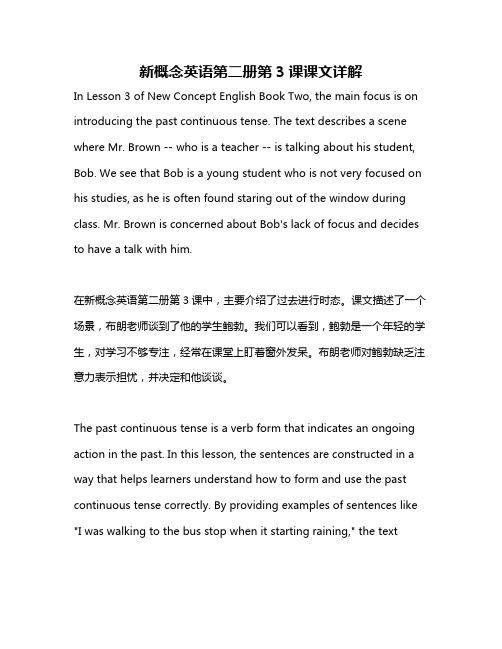
新概念英语第二册第3课课文详解In Lesson 3 of New Concept English Book Two, the main focus is on introducing the past continuous tense. The text describes a scene where Mr. Brown -- who is a teacher -- is talking about his student, Bob. We see that Bob is a young student who is not very focused on his studies, as he is often found staring out of the window during class. Mr. Brown is concerned about Bob's lack of focus and decides to have a talk with him.在新概念英语第二册第3课中,主要介绍了过去进行时态。
课文描述了一个场景,布朗老师谈到了他的学生鲍勃。
我们可以看到,鲍勃是一个年轻的学生,对学习不够专注,经常在课堂上盯着窗外发呆。
布朗老师对鲍勃缺乏注意力表示担忧,并决定和他谈谈。
The past continuous tense is a verb form that indicates an ongoing action in the past. In this lesson, the sentences are constructed in a way that helps learners understand how to form and use the past continuous tense correctly. By providing examples of sentences like "I was walking to the bus stop when it starting raining," the texthelps students see the difference between simple past and past continuous tenses.过去进行时是一个动词形式,表示过去正在发生的动作。
新概念英语第二册Lesson3详解

Please send me a card
Revision: Lesson2
• Words
• Text • Gra2
Grammar:一般现在时
1.构成:使用动词原形,第三人称单数须有变化。 (1)直接加“s”, works,takes
(2)以辅音加“y”结尾,变“y”为“i”,再加 “es”, carry → carries
(3)以“s, x, ch, sh,o”结尾的动词加“es”, goes dresses watches brushes
2.功能: 在句中的位 (1)表现在的事实、状态或动作:置 : 实 义 动 eg: Birds fly. 词之前,非 • She loves music. 实义动词之 Mary's parents get up very early. 后 • (2)表习惯性动作或职业,常与 often,sometimes,usually,always, every week,seldom,frequently 等时间副词连用。 • eg: I always take a walk after supper. She writes to me very often. Tom and his girlfriend go out to take a picnic occasionally.
take和send的区别:
1. take强调某人亲自送。 2. send则是通过第三人去送,如校车。
B.按时间表示将要发生的动作或事件,用一般 现在时表达将来时概念。 • • The play begins at 6:30 this evening. When does the plane take off? He leaves for that city next week. According to the timetable, the express train to Shanghai starts at nine in the morning. (按照时刻表,开往上海的特快列车早上 7 点 出发。) 同样用法的动词有:go,come,leave,arrive, land,meet,die,start,return,join…
新概念英语第二册课后题答案

新概念英语第二册课后习题答案详解Lesson 11. b选b最为正确。
因为a.d.都与课文内容不符合,也不合乎逻辑;c.的意思是“他们没有注意他”,而作者的意图并不是想让他们注意他,而是想让他们停止谈话。
所以选b. 最能表达作者当时心里的感受。
2.c其余3个答案都与原句意思不符合。
3.b因为a. to 不对,可以是He went to the theatre;c. into 也不对,可以是He went into the theatre;d. on更不符合语法,表示在某一个地方用介词in 或at, in 表示在大的空间,如国家,城市等,at 则表示在小的地点或空间,如atthe office, at the theatre 等, 所以选b.是正确的。
4.d b. above(在……上方);c. ahead of (在……的前面,在……之前)不和behind 对应,也不强调位置的前后顺序。
a. before 和d. infront of 都是和behind对应的,都有“在……前面”的意思。
但in front of 更具体的强调位置,而before则包含更宽泛的意思,即时间上,空间,次序,登记,重要性方面的“在……前面”5.c因为用 a. Where, b. why, d. when 提问都不符合逻辑,都不是针对状态提问的,只有How 提问,才能用Angry回答。
6.a b. they 只做主语; c. their只能做定语;d. us 虽然可以做宾语,但与前一句意思不符合。
7.d a. none是代词,很少用在名词前面;b. any 只能用在否定句或疑问句中;c. not any 不符合语法,因为前面没有助动词did.8.b a. chair(椅子), c. armchair(手扶椅) d. class(班级) 这3个选择都和seat的意思不符合。
Seat是”座位,座席”的意思。
强调的是可供坐下的地方,不是具体的椅子。
新概念英语第二册第2课 完整

from time to time 有时候 • almost never;hardly ever;rarely;
scarcely ever;seldom 很少 • not…ever;never 从不
not until...
She didn't go to bed until eleven o'clock. 她直到十一点才上床睡觉。
They didn't find her until the next day. 他们直到第二天才找到她。
• outside /'aut'saɪd/ n. 外面,外部,外观 备注:inside 里边 outsider 局外人
• aunt /a:nt/ n. 姑母,姨母,阿姨,伯母,舅母,舅妈 uncle 叔叔,伯伯,伯父
• repeat /ri'pi:t/ n. 重复 v.重复
He repeated several times that he was busy. Today's lecture was an exact repeat of yesterday's.
Listen to the story and keep these questions in mind.
• What was the weather like last Sunday? • Who was coming to see the writer? • Why was the writer's aunt surprised?
新概念英语第2册课文(完整版)
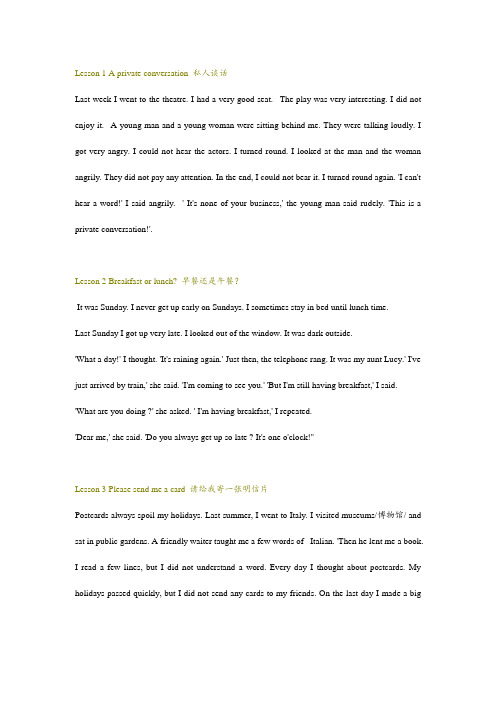
Lesson 1 A private conversation 私人谈话Last week I went to the theatre. I had a very good seat. The play was very interesting. I did not enjoy it. A young man and a young woman were sitting behind me. They were talking loudly. I got very angry. I could not hear the actors. I turned round. I looked at the man and the woman angrily. They did not pay any attention. In the end, I could not bear it. I turned round again. 'I can't hear a word!' I said angrily. ' It's none of your business,' the young man said rudely. 'This is a private conversation!'.Lesson 2 Breakfast or lunch? 早餐还是午餐?It was Sunday. I never get up early on Sundays. I sometimes stay in bed until lunch time.Last Sunday I got up very late. I looked out of the window. It was dark outside.'What a day!' I thought. 'It's raining again.' Just then, the telephone rang. It was my aunt Lucy.' I've just arrived by train,' she said. 'I'm coming to see you.' 'But I'm still having breakfast,' I said.'What are you doing ?' she asked. ' I'm having breakfast,' I repeated.'Dear me,' she said. 'Do you always get up so late ? It's one o'clock!''Lesson 3 Please send me a card 请给我寄一张明信片Postcards always spoil my holidays. Last summer, I went to Italy. I visited museums/博物馆/ and sat in public gardens. A friendly waiter taught me a few words of Italian. 'Then he lent me a book.I read a few lines, but I did not understand a word. Every day I thought about postcards. My holidays passed quickly, but I did not send any cards to my friends. On the last day I made a bigdecision. I got up early and bought thirty-seven cards. I spent the whole day in my room, but I did not write a single card !明信片总会消耗着我的度假时间。
新概念第二册第二课课文讲解

Lesson 2 Breakfast or lunch?早餐还是午餐?【Text】It was Sunday. I never get up early on Sundays. I sometimes stay in bed until lunchtime. Last Sunday I got up very late. I looked out of the window. It was dark outside. ’What a day!’ I thought. ’It’s raining again.’ Just then, the telephone rang. It was my aunt Lucy. ’I’ve javain,’ she said. ’I’m coming to see you.’’But I’m still having breakfast,’ I said.’What are you doing?’ she asked.’I’m having breakfast,’ I repeated.’Dear me,’ she said. ’Do you always get up so late? It’s one o’clock!’【New words and expressions】生词和短语★until prep.直到直到...才;直到...为止后面加(时间状语)从句,前面就是主句1) His father didn’t die until he came back. (肯定)直到他回来,他爸爸才死.2) His father was alive until he came back. (否定)直到他回来为止,他爸爸都是活着的.到他回来这一点之前,没死: not die;活的:不加not.把until作为时间终止线从句的时间终点之前,这个动作做了还是没做?做了——肯定; 没做——否定.he _____(wait) until it stopped raining.A. waitedB.didn’t waitA.leaveB.leftC.didn’t leaveI stay in bed until twelve o’clock.I didn’t get up until 12 o’clock.A(C)_★outside adv.外面作状语He is waiting for me outside.It is cold outsid.★ring (rang.rung) v.(铃、电话等)响(刺耳的)[注]这种响是刺耳的,往往是提醒人做某事The telephone(door bell) is ringing.Every morning the clock rings at 6. 这钟每天早上6点响。
新概念第二册第三课

新概念第二册第三课
新概念第二册第三课的内容主要是关于饮食习惯和健康生活方
式的讨论。
以下是对该课的详细描述:
这一课的主题是关于饮食习惯和健康生活方式的重要性。
课文
以一位女士向医生咨询自己的健康问题为背景展开。
课文开始,女士向医生诉说自己感到疲劳和缺乏活力。
医生询
问她的饮食习惯和生活方式,并指出这些因素可能是她感到疲劳的
原因。
医生建议她改变饮食习惯和生活方式,以改善她的健康状况。
接下来,医生向女士解释了健康饮食的重要性。
他告诉她应该
多吃水果、蔬菜和全谷类食物,并减少摄入高脂肪和高糖分的食物。
医生还提到了均衡饮食的概念,即摄入适量的蛋白质、碳水化合物
和脂肪,以满足身体的需求。
此外,医生还建议女士增加运动量,以提高体能和心肺功能。
他解释了运动对健康的益处,并推荐女士每天至少进行30分钟的有
氧运动,如散步、慢跑或游泳。
医生还提到了保持良好的睡眠习惯的重要性。
他建议女士每晚
保持充足的睡眠时间,并避免过度疲劳。
最后,医生总结了健康饮食和生活方式的益处,包括提高身体
免疫力、预防慢性疾病和保持良好的心理状态。
通过这一课,读者可以了解到饮食习惯和生活方式对健康的重
要影响,并获得一些实用的建议来改善自己的生活方式,以达到更
健康的生活目标。
新概念英语第二册LessonLesson完整版
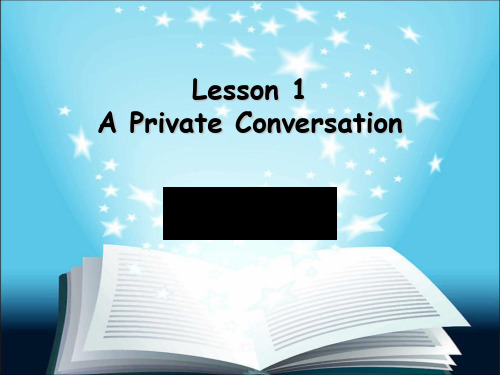
Why was the writer’s aunt surprised?
• It was Sunday. I never get up early on Sundays. I sometimes stay in bed until lunchtime. Last Sunday I got up very late. I looked out of the window. It was dark outside. 'What a day!' I thought. 'It's raining again.' Just then, the telephone rang. It was my aunt Lucy. 'I've just arrived by train,' she said. 'I'm coming to see you.' 'But I'm still having breakfast,' I said. 'What are you doing?' she asked. 'I'm having breakfast,' I repeated. 'Dear me,' she said. 'Do you always get up so late? It's one o'clock!'
• 二、主语+谓语 • We smiled. • They came. • 介词+宾语 • The guests have arrived in the city.
• 三、主语+系动词+表语(形容词)
新概念英语第二册Lesson2课件

look into 1. 向...里看
look into the box 2. 调查,分析
向盒子里面看
The police are looking into the case. 警察正在调查这个案件。
Look out ! 小心,当心
Look out ! The car nearly knocked you over.
2021/3/11
15
How +形容词 + 主语 + 谓语 How careless she is!
当 What +(a/an)+形容词+人称代词(+be动词时, 两者完全相等 What an interesting story it is! = How interesting the story is! What a clever girl she is! = How clever she is!
11学习交流ppt时间范围较广表示某年某季节某月某周某一天的某段时间year在一年中may在五月march7thmondayafternoon在周一下午march7th2013twooclock在两点moment在这一刻注意
Lesson2 Breakfast or lunch?
a story about a man who doesn't like getting up early on Sundays.
6
eg: He___until it stopped raining. A.waited B.didn't wait A.leave. B.left C.didn't leave
• We stayed until the rain stopped. • 我们一直等到雨停为止。 • We didn’t start until the rain stopped. • 直到雨停了我们才出发。 • 她六点才能来。
新概念英语2第三课课文
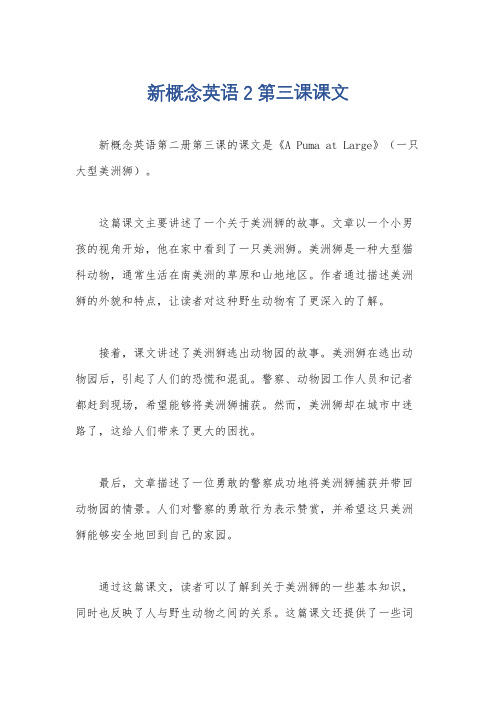
新概念英语2第三课课文
新概念英语第二册第三课的课文是《A Puma at Large》(一只大型美洲狮)。
这篇课文主要讲述了一个关于美洲狮的故事。
文章以一个小男孩的视角开始,他在家中看到了一只美洲狮。
美洲狮是一种大型猫科动物,通常生活在南美洲的草原和山地地区。
作者通过描述美洲狮的外貌和特点,让读者对这种野生动物有了更深入的了解。
接着,课文讲述了美洲狮逃出动物园的故事。
美洲狮在逃出动物园后,引起了人们的恐慌和混乱。
警察、动物园工作人员和记者都赶到现场,希望能够将美洲狮捕获。
然而,美洲狮却在城市中迷路了,这给人们带来了更大的困扰。
最后,文章描述了一位勇敢的警察成功地将美洲狮捕获并带回动物园的情景。
人们对警察的勇敢行为表示赞赏,并希望这只美洲狮能够安全地回到自己的家园。
通过这篇课文,读者可以了解到关于美洲狮的一些基本知识,同时也反映了人与野生动物之间的关系。
这篇课文还提供了一些词
汇和语法练习,帮助学习者提高英语水平。
总的来说,这篇课文生动有趣,通过一个小故事引发了人们对野生动物保护的思考,同时也提供了英语学习的机会。
新概念2 lesson-3课件 (共55张PPT)

• 2. postcard n. 明信片
(1) card 卡片/贺卡 a get-well card an identity card a pack of cards
•Intensive reading
Notes on the text 课文注释
• teach v. • (1) teach sb. sth.
teach sb to do sth teach oneself
e.g. Could you teach me a little English? Who taught you to swim? Nobody. I just taught myself.
初识浊化,急速练习:
[sp]-> [sb]最清晰 sports/ speak/ space [st] -> [sd]最快速 stand/ stop/ start [sk] -> [sg]最慢速 sky/ skirt/ school [str] -> [sdr]最大声 street/ stream/ strict
A friendly waiter _______ me a few words of Italian. Then he _______ me a book. I _______ a few lines, but I did not understand a word.
Everyday I _______ about postcards. My holidays _______ quickly, but I did not send cards to my friends.
for class.
Cultural Tips
新概念英语 第二册 Lesson 2

共读一本书《新概念英语》lesson 2Lesson 2 Breakfast or Lunch?一阅读课文课文内容:Why was the writer’s aunt surprise d?It was Sunday. I never get up early on Sundays. I sometime s stay in bed until lunchtime. Last Sunday, I got up very late.I looked out of the window. It was dark outsi de. ‘What a day!’ I though t. ‘It’s raining again.’ Just then, the telephone rang. It was my aunt Lucy. ‘I've just arri ved by train,’she said. ‘I'm coming to see you.’‘But I'm still havi ng breakfast,’ I said.‘What are you doing?’ She asked.‘I'm having breakfast,’ I repeated.‘Dear me,’ She said. "Do you always g et up so late? It's one o'clock!’1 ring v. (rang,rung)(1)(铃、电话等)响The telephone / door bell is ringing.电话铃/门铃响了。
(2)给……打电话He ran g me at m y mother's.他打电话到我妈妈家找我。
2 repeat v.重复;重说You have to repe at the cl ass.你必须重修这门课。
新概念英语第二册课文 (3)

新概念英语第二册课文Lesson 1 - A private conversationSarah: Good morning, John. How are you today? John: Good morning, Sarah. I’m fine, thank you. How about you? Sarah: I’m great. I wanted to talk to you about something private. John: Sure, go ahead. What’s on your mind? Sarah: Well, I’ve been offered a new job and I’m thinking about taking it. But I wanted to get your thoughts before making a decision. John: That’s great news, Sarah. I’m happy for you. Can you tell me more about the job offer? Sarah: It’s a sen ior position with a higher salary and more responsibilities. However, it also requires relocation to a different city. John: I see. That’s a big decision to make. Have you considered the pros and cons? Sarah: Yes, I’ve thought about it a lot. On one hand, it’s a great opportunity for career growth and financial stability. On the other hand, I’ll have to leave my friends and family behind. John: It’s definitely a tough choice. But sometimes, taking risks and stepping out of our comfort zone can lead to amazi ng opportunities. Sarah: That’s true. I’m excited about the new challenges, but I’m also worried about leaving everything behind. What do you think I should do? John: Ultimately, the decision is yours, Sarah. You have to weigh the benefits and drawbacks an d decide what’s best for your career and happiness. Don’t rush into a decision, take your time to think it through. Sarah: Thank you, John. Your advice means a lot to me. I’ll take some more time to think about it before making a final decision. John: You’re welcome, Sarah. I’m here to support you no matter what you decide. Good luck!Lesson 2 - Shopping for clothesClerk: Good afternoon, madam. How can I assist you today? Maggie: Good afternoon. I’m looking for a dress to wear to a special event. Clerk: We have a wide range of dresses. What style and color are you looking for? Maggie: I would like a classic black dress, something elegant and not too flashy. Clerk: Alright. What size are you? Maggie: I’m not sure. Could you help me with the measurements? C lerk: Of course. Please stand straight and I’ll measure you. Maggie: Thank you. Clerk: Your bust measures 34 inches, waist measures 28 inches, and hips measure 36 inches. Based on these measurements, I would recommend a size 8 or 10. Maggie: Thanks for you r help. I’ll try on both sizes. Clerk: Certainly, madam. The fitting room is right over there. Let me know if you need any assistance. Maggie: Will do, thank you. [After trying on the dresses] Maggie: I tried on both sizes, but I think the size 8 fits me b etter. It’s more comfortable and looks great. Clerk: I’m glad you found the right fit. Is there anything else I can help you with? Maggie: No, thank you. I’m happy with my choice. How much is the dress? Clerk: The black dress is on sale for $100. Maggie: P erfect. I’ll take it. Clerk: Great. Let me ring it up for you.Lesson 3 - At the airportAnnouncer: Attention, please! Flight SV214 to London is now boarding. Passengers are requested to proceed to Gate 14. Passenger 1: Excuse me, is this the right gate for flight SV214 to London? Airport Staff: Yes, it is. Boarding has just started, please proceed to the gate. Passenger 2: How long does the boarding process usually take? Airport Staff: It depends on the flight and the number of passengers. It usually takes around 30 minutes to complete boarding. Passenger 1: Is there any special procedure for carry-on luggage? Airport Staff: Yes, you are allowed one carry-on bag and one personal item. Please make sure they meet thesize and weight restrictions. Passenger 2: Can I bring my laptop bag as a personal item? Airport Staff: Yes, a laptop bag is considered a personal item. It should fit under the seat in front of you. Passenger 1: What about liquids? Can I bring a bottle of water with me? Airport Staff: You are allowed to bring small containers of liquids, but they must be in a clear, resealable plastic bag. Each container should be no more than 100ml. Passenger 2: Thank you for the information. We’ll make sure to follow the regulations. Airport Staff: You’re welco me. Have a pleasant flight!This document includes three lessons from the book。
- 1、下载文档前请自行甄别文档内容的完整性,平台不提供额外的编辑、内容补充、找答案等附加服务。
- 2、"仅部分预览"的文档,不可在线预览部分如存在完整性等问题,可反馈申请退款(可完整预览的文档不适用该条件!)。
- 3、如文档侵犯您的权益,请联系客服反馈,我们会尽快为您处理(人工客服工作时间:9:00-18:30)。
以上三个是指物理上的破坏, 而spoil主要指精 神上的
museum n.博物馆
Palace Museum 故宫
at the museum
在博物馆内
public
adj.公共的,公众的,社会党 in public 公开的 in private私下里的 adj.公开的,众人皆知的 n.公众,群众,大众
spoil-spoiled-spoilt
v.使索然无味、损坏 vt. 宠坏,惯坏,溺爱
Postcards always spoil my holidays. Don’t spoil your children.
spoilt child 被宠坏的孩子 熊孩子
spoil: 把东西的质量变得不好; 生活中不顺心的 事;宠坏, 溺爱 break: 打破; break the windows 打破玻璃 damage: 破坏, 程度不一定很重 destroy : 破坏, 彻底摧毁
postcard 明信片 ID card 身份证 credit card信用卡 cash card现金卡
waiter n.服务员,招待员
waiter(男服务员) chief 商店里的店员 attendant n. (其他公共场所 的)服务员
waitress(女服务员)
friendly adj.友好的 以-ly结尾的形容词还有:lovely, manly,lively, lonely等。
lend v.借出 lend sth. to sb/ lend sb. sth borrow v.借进 borrow sth. from sb
我想找Abby借100万美元。 Abby一毛钱都不肯借我。
whole adj.整个的
a whole bottle of milk 一整瓶牛奶
a whole day 整天 all the day/ all day two whole weeks 整整两星期
single adj. 唯一的,单一的
single ladies 单身女士
double 双倍的
aunt n.姑,姨,婶,舅妈 uncle n.叔叔 cousin n.堂兄妹(不分男女) nephew外甥 niece外甥女
repeat v.重复
They are repeating that wonderful play.
send v.寄,送 send a letter 寄信 send sth. to sb/ send sb. sth.给某人送(寄)什么东西
I want to borrow one million from Abby. Abby isn’t willing to lend me a penny at all.
decision n.决定 make a decision 做出决定 decide v.决定 decide to do 决定
他决定去冒险蹦极。 He decided to take the risk of bungee jumping.
Lesson 2 Breakfast or lunch
outside adv.外面
He is waiting for me outside. It is raining outside.
ring-rang-rung
❶ v.(铃、电话等)响 ❷ vt. 打电话给(美语中用call) ❸ n.(打)电话 give sb. a ring ❹ n. 戒指 The telephone is ringing. Tomorrow I’ll ring you. Ring finger.
